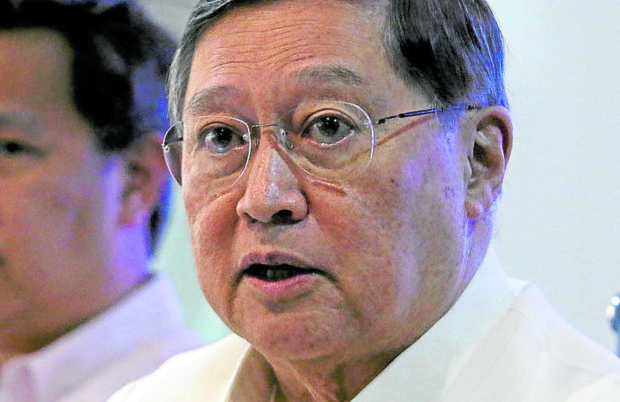MANILA, Philippines—Despite lack of massive financing as pledged by developed nations that polluted the planet more, the Philippines is moving forward with its climate resiliency programs before it’s too late, Finance Secretary Carlos Dominguez III said on Thursday (March 10).
“The Philippines is ready to push ahead with implementable climate change action projects. This is because the planet cannot wait and the fate of future generations hangs in the balance,” Dominguez said at the launch of the United States Agency for International Development’s (USAID) $15-million, five-year climate resilient cities project.
This USAID project formed part of the US government’s commitment of at least $82.4 million in grants in the next five years to support the Philippines’ initiatives in climate resilience, clean and efficient energy, faster internet, as well as women empowerment.
“This timely initiative will help arm our local communities with the necessary knowledge to enable them to formulate climate adaptation and mitigation projects on the ground,” Dominguez said.
The USAID project will benefit the cities of Batangas, Borongan, Cotabato, Iloilo, Legazpi, and Zamboanga, the Department of Finance (DOF) said in a statement.
“The project aims to assist these LGUs [local government units] in using climate information for planning and decision-making; improving their capacity to access, and manage climate finance; and increasing their climate resilience through natural climate solutions,” the DOF said.
Dominguez, appointed by President Rodrigo Duterte as chair-designate of the Climate Change Commission, again lamented that while the Philippines—despite a miniscule contribution to climate change—committed to ambitiously reduce its greenhouse gas emissions by 75 percent eight years from now “we are disappointed that the Western countries with the greatest volume of emissions were far less ambitious in their commitments to rescue the planet.”
“On top of that, the Western countries that polluted and continue to pollute the planet the most for the last 170 years are not fulfilling their commitment to provide $100 billion in annual financing support for the global mitigation effort,” Dominguez said.
“We are disappointed that the highly industrialized nations are taking their time, splitting hairs, theorizing endlessly while the planet burns,” he said.
“Addressing climate change is an urgent undertaking. The financing mechanism promised by the Western countries was supposed to drive green financing, especially in emerging economies willing to lead the way in mitigation,” according to Dominguez.
“Since it seems that the global climate fund will not be available and accessible anytime soon, the developing countries should now prepare to undertake mitigation measures on their own,” the finance chief said.
“The Philippines cannot wait for the industrial nations to recognize the urgency of the situation. We are determined to move ahead on our own if necessary. We will take action now. We owe that to the Filipino people,” Dominguez added.
Dominguez noted that the Philippines already put in place a sustainable finance roadmap since last year to attract public-private “green” investments.
He said that in cooperation with the Manila-based Asian Development Bank (ADB), the Philippines was also venturing into the energy transition mechanism (ETM) to retire coal-fired plants and replace them with clean energy sources, starting in Mindanao.
“At the COP26 meeting in Glasgow, the Philippine delegation underscored the need for a sustainable mix of grants for capacity building, investments in green projects, and subsidies addressing the needs of communities transitioning to a climate-resilient economy,” Dominguez said.
“These three simple elements should be at the heart of climate finance. However, the COP seems to require three more years to work out the definition, concept, and parameters of climate finance,” Dominguez added.
“The Philippine delegation also broached a proposal for the multilateral banks to collaborate in catalyzing financial flows to developing countries to meet their climate change objectives,” he said.
“These multilateral banks are best capable of ensuring processes that enhance trust, enforce transparency, and encourage prudence in spending taxpayers’ money,” the finance chief added.
